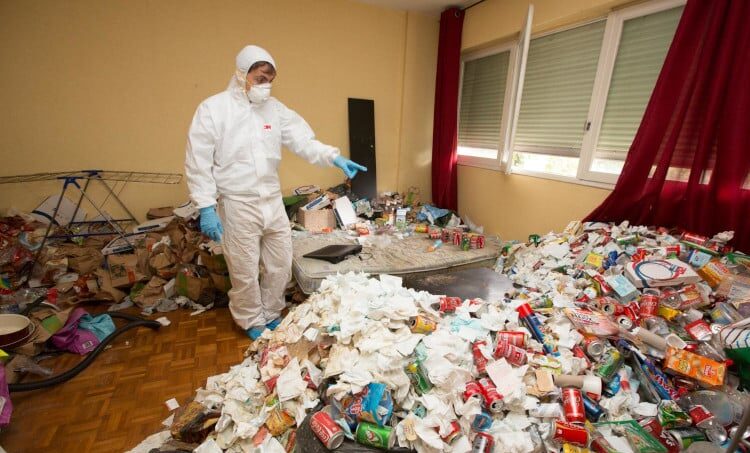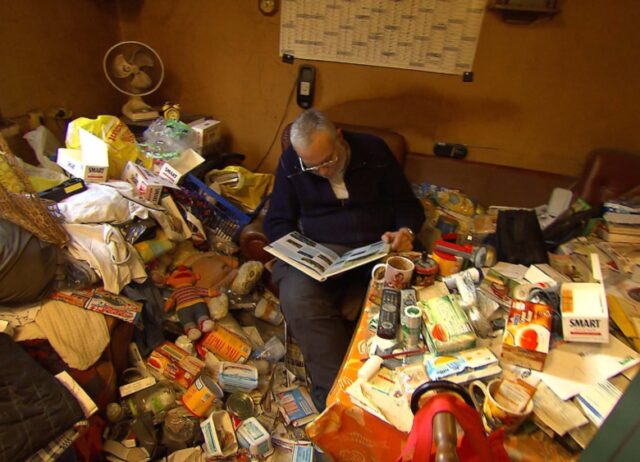
Diogenes Syndrome – A Different Kind of Hoarding
Diogenes syndrome is a term most people haven’t heard of until they have had to face it with someone in their family or friend circle. And it’s often confused with another mental illness that looks very slimier – hoarding.
Let’s look at what exactly DS is, how it happens, what can be done, and other useful information.
What Is Diogenes Syndrome
DS is a kind of behavioral disorder that usually happens when someone gets older. Other names include senile squalor syndrome, senile breakdown, Plyushkin’s syndrome, or social breakdown.
A person with DS lives with extreme self-neglect. This includes domestic squalor, social withdrawal, apathy, compulsive hoarding of garbage or animals, and a lack of shame towards their living situation and health conditions. Many of the hoarded items don’t have any sentimental value and can often be garbage.
This will often end up creating environments for rodents, insects, mold, and other dangerous things to thrive.
But what’s the difference between DS and compulsive hoarding?
Well nearly all people with DS will be hoarders but not all hoarders have DS. Also, general hoarders often hold a great deal of shame towards their living conditions. They don’t want people to see where they live, because they don’t want everyone to know what they surround themselves with. Hoarders also see every item as sentimental. They have a hard time letting anything go.
Diogenes Syndrome Problems
Because of the lack of shame and the social withdrawal (as well as the very slow onset of the disorder), most of the surrounding family and friends will have no idea what’s going on until the sufferer is deep into their self-neglect to the point of danger.
And since doctors and researchers are still having a hard time pinpointing a root cause, it’s nearly impossible to know what red flags to look for (aside from literally going into someone’s house and making sure they are okay).
Here are some research contradictions…
- DS happens in both men and women
- It happens to those who have lived in poverty and to those who have not
- It can occur in people who have experienced past trauma or those who haven’t
- People of all levels of intelligence are affected
The only thing that professionals can agree on is…
- Patients have abnormal possessiveness and patterns of collection in a disordered way.
- Probably damage to the prefrontal areas of the brain, which affects decision making
- The self-neglect comes from a total physical collapse or mental breakdown
- Emotions that come with DS include aggressiveness, stubbornness, suspicion of others, unpredictable mood swings, emotional instability, and a deformed perception of reality.
- It can be linked to schizophrenia, obsessive-compulsive disorder, depression, and dementia addiction (mainly alcohol).

Managing DS
Here is where things get tricky (especially for doctors). DS patients don’t see their hoarding or self-neglect as a problem. Couple this with suspicion and aggression, and they often angrily refuse treatment.
This leaves doctors in a problematic situation since in most situations they’re not allowed to force treatments on people. But, for example, in cases where someone can’t even walk, they might have to accept help.
But that’s not all. Studies have shown that people with DS who are forced into a hospital often get worse (some dying). And if they end up in a nursing home (with many in the USA being stigmatized for poor treatment of seniors, it can end up in a place that hurts more than helps.
Even if they can get the patient into a decent nursing home, success rates show that having only one dedicated nurse and social worker will give any positive results.
The best results of all show that senior daycare is the best. People can go and socialize with others. This helps combat breakdowns and builds healthy relationships (and works against one of the major factors of DS, which is social isolation). There are also home cleaning and food delivery services.
Interesting Diogenes Syndrome Etymology
Did you know that “Diogenes” was coined by A.N.G. Clarke in the mid‑1970s. However, there was a real Diogenes of Sinope. He was an ancient Greek philosopher, a Cynic, and an ultimate minimalist, who allegedly lived in a large jar in Athens.
The funny thing is, he was the opposite of a hoarder or a social isolationist. He lived simply and would walk to Agora every day to be around people. He loved company. So the term is a bit of a misnomer.
DS End Thoughts
This syndrome can be quite scary to think of, let alone watch someone go through it.
The best thing you can do is keep a loving eye on the older members of your family. Be a strong social link. Watch out for things like falling levels of self-care (hygiene, matted hair, body odor, untrimmed nails, malnutrition, dehydration, unexplained injuries, etc).
Offer to help, and if they refuse, talk to a doctor to see if there is something you should do next.












